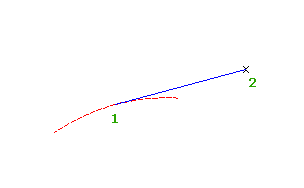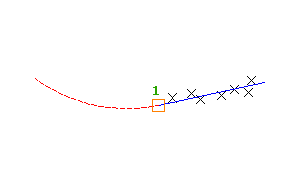To add a floating vertical straight with a specified pass-through point
Add a floating vertical straight by specifying an attachment element and a pass-through point.
The figure shows a floating straight from an attached element (1) to a pass-through point (2).

- Click the profile. Click

 Find.
Find. - On the Profile Layout Tools toolbar, click
 Float Straight (Through Point).
Float Straight (Through Point). - Specify the fixed or floating curve to which you want to attach the straight.
- Specify the pass-through point.
To add a floating vertical straight by best fit
You can define the best fit element using a series of AutoCAD Civil 3D points, AutoCAD points, existing elements, or clicks on screen.
The illustration shows a floating vertical straight created by best fit from an existing endpoint (1). The Xs indicate the data points used to create the element.

- Set the profile view style Vertical Exaggeration value to 1.0000.
- Click the profile. Click

 Find.
Find. - On the Profile Layout Tools toolbar, click
 Float Straight - Best Fit.
Float Straight - Best Fit. - Select an existing fixed or floating profile element to which to attach the best fit straight.
- In the Straight by Best Fit dialog box, select one of the following:
- From COGO Points. In plan view, select two or more points. Enter G to select a point group or N to enter points by number.
- By Clicking On The Screen. Select a starting point and at least one other point. You can use OSNAP or transparent commands to select points.
- From Elements. Specify the tessellation and mid-ordinate tolerance settings. You can select one or more of the element types listed on the command line. If you selected a profile element, specify the starting and ending station on the Specify Station Range dialog box.
- In plan view, select two or more points. Enter G to select a point group or N to enter points by number.
As the points are selected in plan view, an X marks each regression point and a temporary, dashed straight is displayed in the profile view.
- Press Enter to complete the command.
- In the Panorama window, use the Regression Data vista to modify the regression points.
As you highlight a row in the Regression Data vista, the corresponding regression point in the drawing window is highlighted in red.
- Create the straight:
- Click
 to create the straight and keep the Regression Data vista open.
to create the straight and keep the Regression Data vista open. - Click
 to create the straight and close the Regression Data vista.
to create the straight and close the Regression Data vista.
- Click